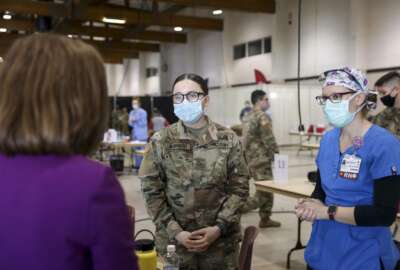One state’s National Guard says it won’t be complying with federal vaccine mandate
In today's Federal Newscast, the Oklahoma National Guard has decided to defy DoD’s COVID-19 vaccine mandate.
To listen to the Federal Newscast on your phone or mobile device, subscribe in PodcastOne or Apple Podcasts. The best listening experience on desktop can be found using Chrome, Firefox or Safari.
- The Oklahoma National Guard has decided to defy the Defense Department’s COVID-19 vaccine mandate. As one of his first official acts, the Oklahoma guard’s new adjutant general signed a new policy last week saying the state won’t enforce the mandate. State officials acknowledge the new policy only affects soldiers and airmen on state active duty – they’ll need to be vaccinated to participate in DoD-funded training or missions. A spokesman for the National Guard Bureau tells Stars & Stripes that distinction between state and federal status makes Oklahoma’s decision a “legal grey area.” (Associated Press)
- Another federal employee union is looking for an extension to the vaccine mandate. The National Federation of Federal Employees says federal workers should have the same January deadline as contractors and large private sector employers do. The union also says federal employees should have the option to be tested weekly if they’re not fully vaccinated. NFFE says employees are anxious because their agencies haven’t processed all medical or religious exception requests yet. Federal employees have until Nov. 22 to be fully vaccinated. (Federal News Network)
- The Biden administration says a full-year continuing resolution could be bad news for agencies. The Office of Management and Budget is urging Congress to work out full-year appropriations bills with additional funding for the rest of 2022. The administration says health research, defense and cybersecurity programs will be under-funded without a full-year deal. OMB says the Social Security Administration might face a hiring freeze without additional funding. The current continuing resolution expires Dec. 3. (Federal News Network)
- The Office of Personnel Management is out with new advice for agencies on building and expanding telework and remote work programs. It’s the first time OPM has updated its telework guide in the last decade. OPM says agencies should use the lessons they learned during the pandemic to make telework more permanent. Remote work can help agencies recruit talent with hard-to-find skills or retain employees nearing retirement. But remote work isn’t for everyone. OPM says it’ll take the right employee to succeed remotely, and the right supervisor to keep that person engaged and productive. (Federal News Network)
- The U.S. government is joining an international push to secure cyberspace. Last week, Vice President Kamala Harris announced the U.S. decision to join the Paris Call for Trust and Security in Cyberspace. A total of 80 countries have now made the voluntary commitment, which advocates for a free, open and peaceful internet. The White House said joining the call is consistent with U.S. domestic and international policy, including U.S. emphasis on human rights, freedom of expression and privacy.
- The government will soon be able to set up a new emergency response fund for dealing with major cyber attacks. When President Biden puts his pen to infrastructure bill this week, he’ll be signing into law a $100 million Cyber Response and Recovery Fund. The legislation will allow the Secretary of Homeland Security to declare a significant cyber incident in the event of an ongoing or imminent attack. The Cybersecurity and Infrastructure Security Agency will then be able to use the new fund to help federal and non-federal entities either ward off the attack or recover from it. The $100 million included in the bill is spread out over five years.
- Trucks carrying mail for the Postal Service don’t often run more than four hours late. But the USPS inspector general says it can significantly impact service performance when it happens. The IG finds 19 million of its highway contract routes ran late between fiscal 2018 and 2021. Of those, less than 3% of those late trips ran longer than four hours. The watchdog finds severe weather accounts for about 16% of those critically late trips, and that contractors were at fault for 60% for the trips.
- The Biden administration is working on an executive order focused on improving customer service across government. The upcoming executive order directs agencies to set customer service performance goals, and deliver those services equitably and effectively, especially to underserved communities. A draft version of the executive order obtained by Federal News Network designates USA.gov as a one-stop-shop to navigate government services. It also orders agencies to reduce the time it takes for customers to obtain government services, and to work on several cross-agency customer service projects. (Federal News Network)
- President Biden says he’ll nominate Dr. Robert Califf as commissioner of the FDA. The agency hasn’t had a Senate-confirmed leader since the start of the administration. Califf also served as FDA commissioner during the final year of the Obama administration. He’s worked since then as a policy advisor to Google and a researcher at Duke University. The agency is currently led by Dr. Janet Woodcock, a career official who’s served as acting commissioner since January. (Federal News Network)
Copyright © 2025 Federal News Network. All rights reserved. This website is not intended for users located within the European Economic Area.
Eric White
Eric White is news anchor and Federal Drive producer at Federal News Network.
Follow @FEDERALNEWSCAST






